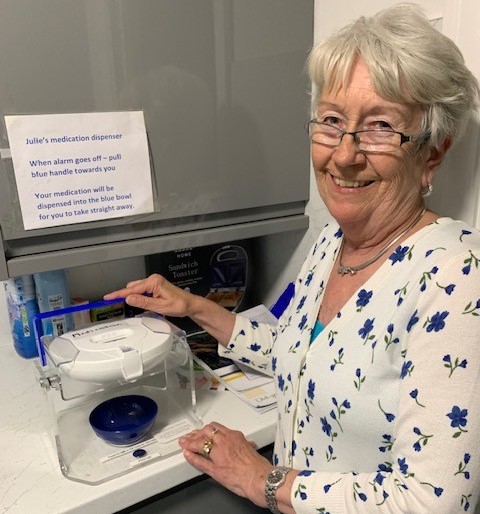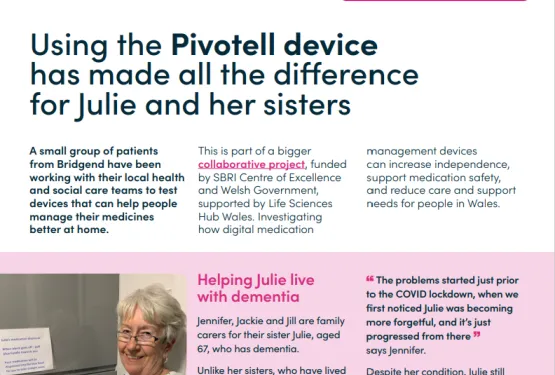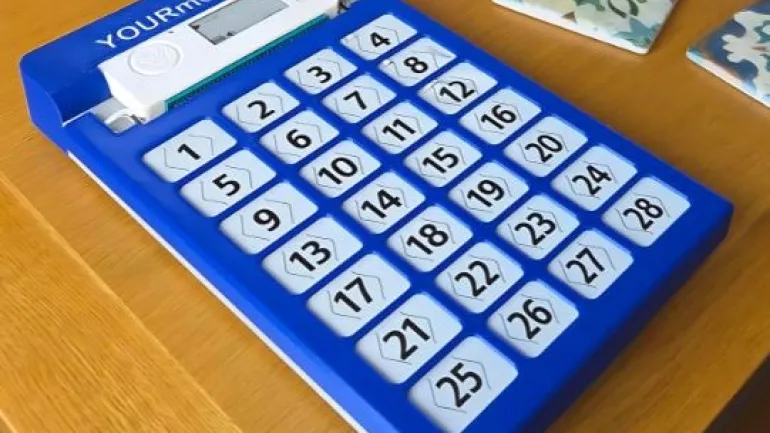A small group of patients from Bridgend have been working with their local health and social care teams to test devices that can help people manage their medicines better at home.

This is part of a bigger collaborative project, funded by SBRI Centre of Excellence and Welsh Government, supported by Life Sciences Hub Wales. Investigating how digital medication management devices can increase independence, support medication safety, and reduce care and support needs for people in Wales.
Helping Julie live with dementia
Jennifer, Jackie and Jill are family carers for their sister Julie, aged 67, who has dementia.
Unlike her sisters, who have lived most of their lives close to home in Porthcawl, Julie lived abroad in Tenerife for many years and travelled the world during her career working on cruise ships. She moved back to Porthcawl in 2011 and was diagnosed with early-onset Alzheimer’s disease a few years ago.
“The problems started just prior to the COVID lockdown, when we first noticed Julie was becoming more forgetful, and it’s just progressed from there,” says Jennifer.
Despite her condition, Julie still manages to live independently in her own flat. Her three sisters all live a short walk or drive away and visit her every day, arranging food to be delivered that she can heat in the microwave, and helping her with daily life. This has supported Julie’s wish to stay living in her own home for as long as possible.
Keeping on top of medication
As her cognitive function has declined, the sisters have found it increasingly difficult to make sure Julie is taking her medication at the right time every day. Julie is prescribed a mix of medication for dementia and anxiety, including drugs to slow the progression of Alzheimer’s which must be taken regularly.
“It was causing us a lot of anxiety”, says Jackie. “We were having to take the tablets away with us as she just didn’t know what she was taking. Sometimes she’d take her meds but then forget and say she hadn’t, so we wouldn’t know whether to give her more. With the kind of medications she’s taking, it was dangerous.”
At one point, the sisters were visiting up to three times a day to make sure the right drugs were being taken at the right time.
Due to behaviour changes caused by the dementia, Julie can feel quite cross if she’s challenged, and disagreements with her siblings over whether medication had been taken were becoming a trigger for angry outbursts.
“For someone like Julie, who’s always been so independent in the past, it’s been hard for her to have to rely so much on us and have us visit so often”, explains Jackie.
Julie agrees, admitting “sometimes they got on my nerves [coming] back and forth, …I like my own company. It’s my house and I like it quiet!”
A safer solution
It was Jennifer’s daughter Nicky, who works in a Community Pharmacy Hub, who suggested Julie could benefit from a medication management device. A referral from Julie’s GP led to her being invited to trial the Pivotell medication dispenser.
The Pivotell machine is a timed pill dispenser. It holds up to 28 doses and can be programmed to sound alarms and rotate to expose the correct dose at scheduled times. It comes with a tipper stand, which makes it easier to tip medication into a container or hand for those with limited dexterity. Some models can also be set to send alerts to a nominated circle of care (which can include family members) or Telecare Alarm Receiving Centres, if a dose is missed.
“The Pivotell is great for when we might be concerned about a person’s ability to use a device, risk of overdose or having difficulties with getting the tablets out of a packet”, explains Tom Sauter, the Clinical Lead Pharmacist for the project.
“It really helps with medication safety, as the locked compartments prevent double-dosing or tampering, which is especially important for those with dementia or cognitive impairment.”
Giving Julie some independence back
Julie says that using the device has made all the difference to her daily life.
“I love it, it’s much easier for me than trying to remember my tablets”, says Julie. “I only have to tip it towards me and the tablets fall into the bowl… I can carry it into my bedroom if I decide to watch tv in bed some evenings, and it saves me getting up to go to the kitchen to take them when it goes off.”
The family agrees Julie seems a lot more confident and in control of her medication.
“Taking her tablets is an enjoyable task now, because it’s something she knows she can do”, says Jennifer.
If Julie doesn’t pull down the arm on the machine when her medication is due, the alarm will sound until the medication is removed.
“The times Julie’s forgotten to take the pills straight away, she knows if they’re still sitting in the dish they need to be taken, and when we visit, we just check to make sure there are no tablets sitting there.”
We’ve all got our lives back
Julie is now taking her medication more consistently, which is helping to slow the progression of her dementia, and her sisters believe that using the device has extended the amount of time she’ll be able to live independently.
Between them, Julie’s sisters still visit her every day, but the stress and conflict around medication has been taken away.
“It’s helped her self-esteem to have that bit of independence back, which has really boosted her mood. It’s made our lives so much easier too”, says Jennifer.
“We’ve all got our lives back since Julie’s been using the device, and it’s really helped to improve the dynamic of our family relationship.”
If you want to access support similar to that outlined in this case study, learn more about the project here.


